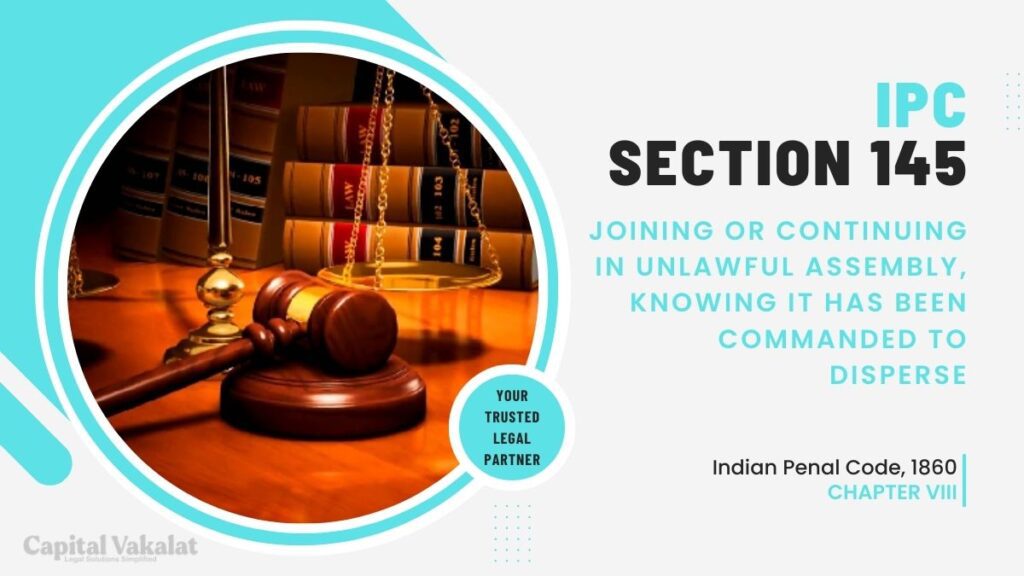Section 145 of the Indian Penal Code (IPC) addresses the act of joining or continuing in an unlawful assembly while knowing that it has been commanded to disperse.

This article explores the elements, historical background, and significance of this section in modern India.
Elements of Section 145 IPC
Unlawful Assembly
An unlawful assembly refers to a group of five or more individuals who have assembled with the common object of committing an unlawful act, or a lawful act by unlawful means. Section 145 is primarily concerned with assemblies that have the potential to disturb public peace.
Presence Despite the Command to Disperse
The crux of this section lies in the participants’ knowledge that they are part of an unlawful assembly, and yet they continue to be present at the scene even after a legal authority commands them to disperse. This disobedience to the lawful command is a critical element in establishing guilt.
Criminal Liability
If proven in court, individuals found guilty under Section 145 IPC can face criminal liability, which may include imprisonment. The severity of punishment depends on various factors, including the nature of the assembly and the potential threat it poses to public order.
Historical Background of Section 145 IPC
Colonial Influence
Section 145 IPC has its roots in British colonial-era legislation. During the colonial period, British authorities were keen on suppressing any form of collective protest, fearing a threat to their rule. This led to the introduction of laws to curb unlawful assemblies.
Post-Independence Modifications
After gaining independence in 1947, India retained Section 145 but introduced modifications to adapt to the changing times. The emphasis shifted from suppressing political dissent to maintaining public order and ensuring the protection of individual rights.
Significance of Section 145 IPC in Modern India
Ensuring Public Order
Section 145 IPC plays a crucial role in maintaining public order. It empowers law enforcement to disband assemblies that could lead to violence, ensuring the safety and security of the general public.
Protection of Rights
By prohibiting individuals from continuing in an unlawful assembly after being ordered to disperse, this section safeguards the rights and freedoms of those who might be affected by the unlawful assembly’s activities.
Legal Consequences
The legal consequences of violating Section 145 IPC serve as a deterrent. Individuals contemplating participation in unlawful assemblies may think twice when they understand the potential criminal liability they could face.
Challenging Section 145 IPC
Legal Remedies
Individuals accused under Section 145 IPC have legal avenues to challenge their charges. They can seek legal counsel and present their case in court, asserting their innocence or challenging the assembly’s classification as unlawful.
Notable Cases
Several notable cases have arisen under Section 145 IPC, shaping its interpretation and application over the years. These cases provide valuable insights into how the law has been enforced and how courts have ruled on such matters.
Conclusion
Section 145 IPC serves as a vital tool in maintaining public order and protecting the rights of individuals in India. It reflects the evolution of legal provisions from a colonial legacy to a modern legal framework. By understanding its elements and significance, citizens can appreciate its role in ensuring a peaceful and just society.
FAQs
What legal consequences do individuals face if found guilty under Section 145 IPC?
Individuals found guilty can face criminal liability, which may include imprisonment, depending on the nature and potential threat of the assembly.
Can individuals challenge their charges under Section 145 IPC?
Yes, individuals accused under Section 145 IPC can seek legal remedies, present their case in court, and challenge their charges.
How has Section 145 IPC evolved over the years?
Section 145 IPC has evolved from a colonial-era provision focused on suppressing political dissent to a modern legal framework emphasizing public order and individual rights protection.
Are there any landmark cases related to Section 145 IPC?
Yes, there are several notable cases that have influenced the interpretation and application of Section 145 IPC, providing insights into its enforcement and court rulings.